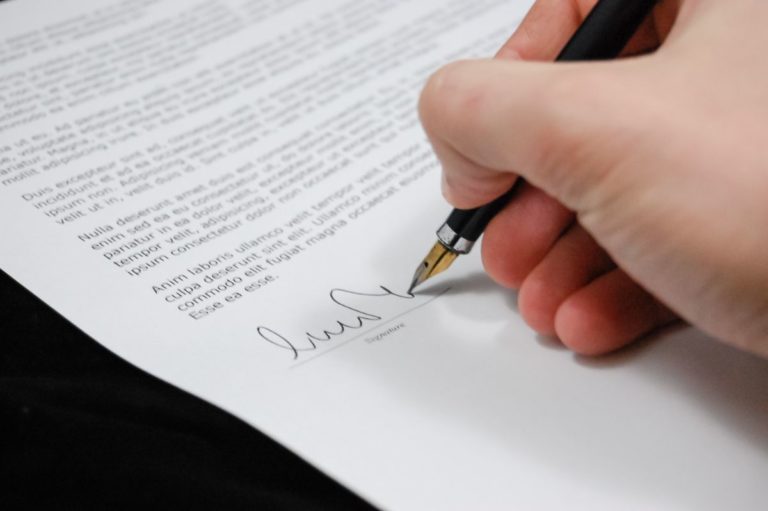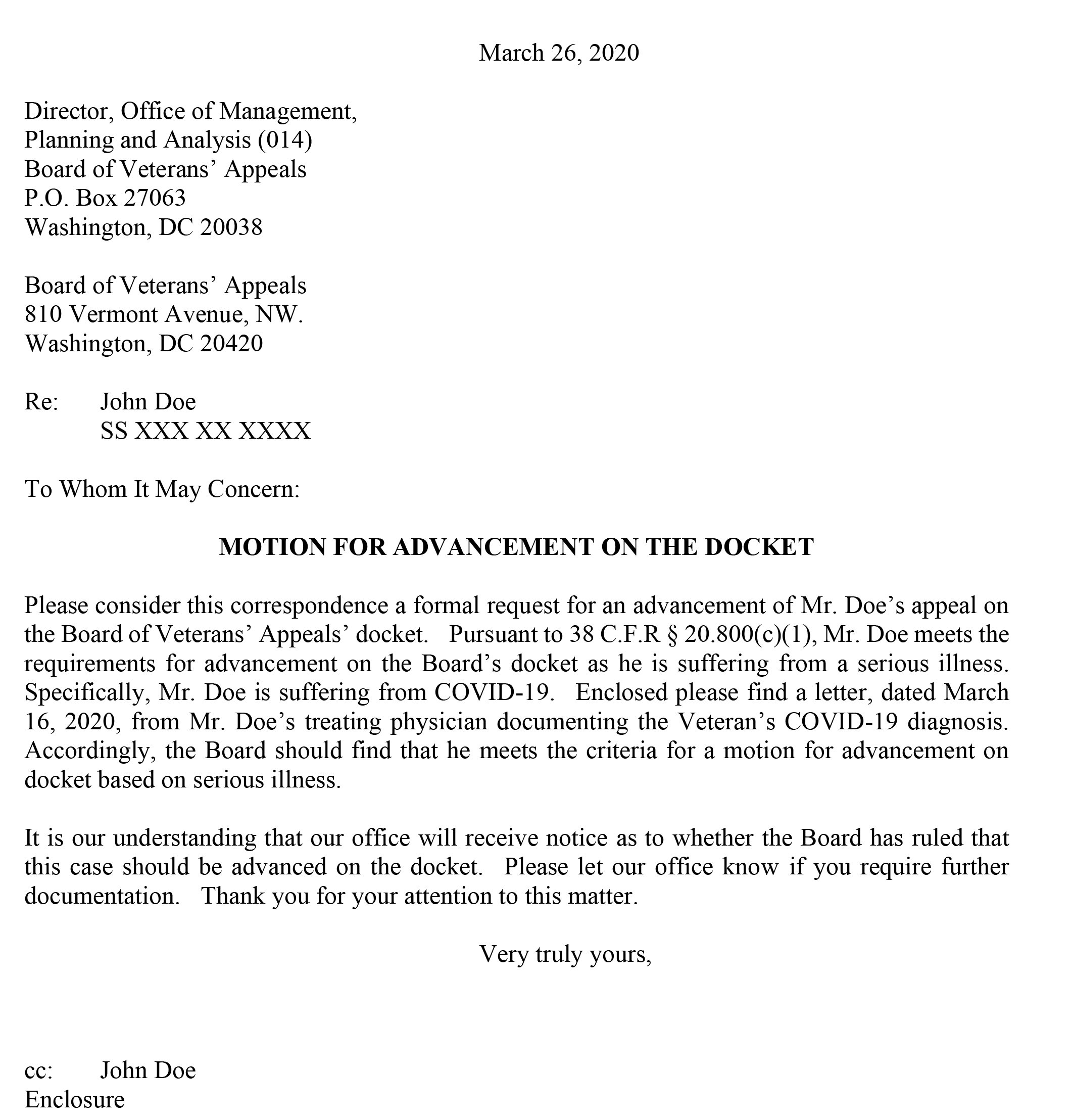How to File a Motion for Advancement on the Docket

CCK Law: Our Vital Role in Veterans Law
What is a Motion for Advancement on the Docket (AOD)?
As required by law (38 U.S.C. § 7107(a) and 38 C.F.R. § 20.900(c)), the Board of Veterans’ Appeals reviews appeals in docket order. In other words, it reviews appeals in the order they were received. However, veterans can submit what is called a “motion for advancement on the docket” (AOD) if they are suffering from unusual hardship or “other sufficient cause”, effectively asking the Board to expedite its review of their appeal. According to BVA’s website, AODs can be submitted under certain circumstances, including the following:
- Serious illness, including COVID-19 (with statement from a physician);
- Financial hardship, such as bankruptcy, foreclosure, or homelessness;
- Advanced age (before the Board of Veterans’ Appeals, advanced age is defined as 75 years or more);
- Affected by natural disaster such as a hurricane, tornado, flood, etc. (with corroborating evidence explaining how you were affected); or
- Administrative error that resulted in a significant delay in your appeal being added to the Board’s docket.
Advancement on the Docket (AOD) Due to COVID-19
As mentioned above, the Board is now accepting requests for AODs due to a diagnosis of COVID-19. Included below is an example of a motion for AOD for COVID-19 purposes. Importantly, the letter references the specific regulation which allows for advancement on the Board’s docket due to serious illness: 38 CFR § 20.800(c)(1). Additionally, the letter is accompanied by treatment notes from the veteran’s doctor documenting their COVID-19 diagnosis.

Do I Need to Submit Evidence with My Motion for Advancement on the Docket?
It is important to note that any motion for AOD submitted to the Board must be accompanied by the appropriate supporting evidence or documentation.
Financial Hardship: Motion for Advancement on the Docket
Veterans can request advancement on the docket if they are experiencing extreme financial hardship. While financial hardship can take many different forms, veterans can use certain types of evidence to support their request. Examples of useful types of evidence include the following:
- Eviction notices
- Past due bills (e.g., medical or utilities bills)
- Collection notices
- Bankruptcy petition
- Home foreclosure notice
Although separate from advancement on the docket, if VA looks at the evidence submitted and determines that it is sufficient to show the veteran is experiencing financial hardship, it should “flash” their file in its electronic system. By flashing a veteran’s file, VA employees are able to see that a veteran’s claim should be handled with expeditious treatment. This may be helpful for veterans after a Board decision is made. Specifically, if the veteran receives a grant or a remand, their case should be handled promptly at the Regional Office level.
Homelessness: Motion for Advancement on the Docket
Importantly, if a veteran is homeless, VA can expedite their claim for benefits as well. Again, this is separate from the motion for advancement on the Board’s docket; however, it may be helpful in conjunction with a request for AOD. VA uses the legal definition of homelessness outlined in 42 USC § 11302, which states that a person is considered “homeless” if they:
- “Lack a fixed, regular, and adequate nighttime residence;” or
- Have a “primary nighttime residence that is a public or private place not designated for or ordinarily used as a regular sleeping accommodation” such as a parking lot, vehicle, public transportation station, or abandoned building; or
- Lives in a shelter
VA will also flash a veteran’s file if they are at imminent risk of becoming homeless. If a veteran meets this criteria, not only are they eligible for AOD, but they should get “priority processing” at the Regional Office as well.
Advanced Age: Motion for Advancement on the Docket
Again, the age requirement for AOD is 75 years of age or older. This is fairly straightforward when it comes to requesting an advancement. The veteran should simply submit their date of birth and/or birth certificate with their request. Nonetheless, it is important to note that veterans should be eligible for expeditious treatment at the Regional Office as well if they are 85 years of age or older. For example, a 77-year-old veteran may have their case advanced on the Board’s docket, but their file will not be flashed for expeditious treatment at the Regional Office. On the other hand, if a veteran is 87 years old, it is likely that their case will be advanced at the Board and expedited at the Regional Office.
Serious Illness: Motion for Advancement on the Docket
If a veteran is looking for advancement on the docket due to serious illness they should submit the following evidence:
- VA medical records
- Private treatment records
- Letter from treating physician
- Medical opinion
In addition to AOD, VA is instructed to prioritize claims in which the veteran is terminally ill. When VA receives the evidence and finds it sufficient to support that they are seriously ill, it should advance the veteran’s claim on the docket and flash their file for expeditious treatment.
Natural Disaster: Motion for Advancement on the Docket
Natural disasters sufficient for AOD include hurricanes, tornadoes, floods, fires, and more. Evidence to attach with requests for AOD due to natural disaster may include the following:
- Documentation of FEMA assistance
- Newspaper articles
- Pictures of damage
How Do I Submit My Motion for Advancement on the Docket?
Importantly, AODs must be submitted in writing and identify the specific reason(s) as to why advancement on the docket is being sought. The request for AOD should include the name of the veteran and the name of the appellant if other than the veteran (e.g., a veteran’s surviving spouse or dependent, fiduciary). The request should also include the appropriate claims file number. Your documentation can be mailed or faxed to the Board of Veterans’ Appeals at the below address or fax number:
Board of Veterans’ Appeals
P.O. Box 27063
Washington, DC 20038
844-678-8979 (fax; toll free)
Additional Tips for Submitting Motion for Advancement on the Docket
When mailing motions for advancement on the Board’s docket to VA, it is important for veterans to always keep copies of their records. This includes the request for advancement itself and the accompanying evidence. It is possible that VA will ask for these records on multiple occasions. As such, veterans should have extra copies available. It may also be helpful for veterans to send “Certified Mail Return Receipt Requested” so that they are aware of when VA receives their request.
About the Author
Share this Post
